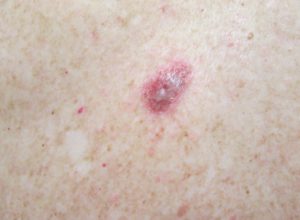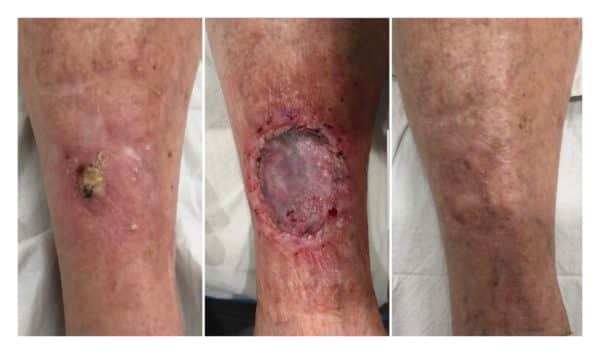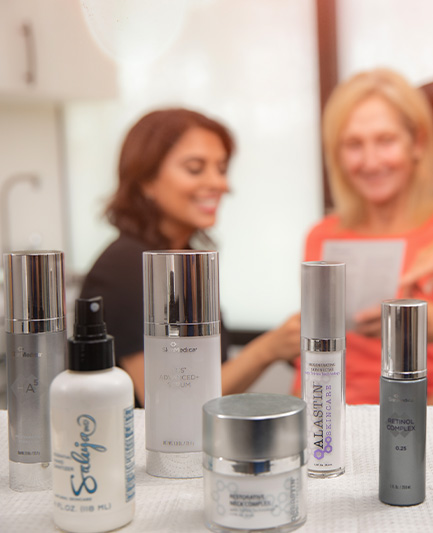SEARCH OUR WEBSITE
Squamous cell carcinoma is the second most common type of skin cancer, and many of us will be affected by it in our lifetime. Florida residents are at a slightly higher risk because they live closer to the equator. If you suspect you may have a squamous cell carcinoma, place your trust in the expert medical team at Dermatology + Plastic Surgery, led by double board-certified plastic surgeon Rebecca Novo, MD, and board-certified dermatologist Anita Saluja, MD, where skin cancer screening and treatment is provided for residents of Melbourne, Indialantic, Viera, Brevard County, and nearby Central Florida communities.
What are the symptoms of Squamous Cell Carcinoma?
Squamous cell carcinoma commonly appears on the body’s most visible and exposed areas, such as the face and hands, but it may also develop on less exposed areas of the body, such as the mouth. Squamous cell carcinoma may also develop on other areas of the skin as a consequence of severe burns or exposure to hazardous chemicals. A squamous cell carcinoma usually appears as a red bump, a scaly patch, or a crusty sore that heals and repeatedly comes back. The visible signs of a squamous cell carcinoma include:
- A crusty or scaly reddish patch
- An open sore that bleeds, itches, heals and keeps coming back
- A lump or growth that feels rough or scaly
- A scaly patch that forms on the lip on other areas of the face

Who is at increased risk for Squamous Cell Carcinoma?
Typically people with fair skin and light eyes are most vulnerable to squamous cell carcinoma, yet this form of cancer can also develop in darker-skinned people. Anyone who spends a lot of time in the sun or who has been exposed to excessive sunlight or tanning beds over the course of many years may be at increased risk, as well as patients on immune-suppressing medication or who have a history of high-risk human papillomavirus (HPV).
How do I know if I have Squamous Cell Carcinoma?

If you have a growth or mole on your skin that fits the description of squamous cell carcinoma or any other form of skin cancer, you should immediately contact our office for a skin cancer screening to rule out any possibility of malignancy or to begin early treatment in case your lesion is indeed a squamous cell carcinoma.
What are the options for treating Squamous Cell Carcinoma?
Squamous cell carcinoma is usually treated safely and successfully using surgery, often called excision and repair to remove the growth. Early detection is critical to the treatment’s success. The same procedures used to remove basal cell carcinoma may be used to remove squamous cell carcinoma as well, including frozen section surgery or Mohs surgery. More advanced cases of squamous cell carcinoma may rarely need chemotherapy or radiation therapy.
Does health insurance cover treatment for Squamous Cell Carcinoma?
Usually, health insurance will cover part or all of the cost for treatment of squamous cell carcinoma. To help manage any costs that may not be covered by health insurance, our office offers various payment options.
If you have a suspicious-looking growth or lesion on your skin and suspect it may be squamous cell carcinoma, contact Dermatology + Plastic Surgery, led by board-certified dermatologist Anita Saluja, MD and double board-certified plastic surgeon Rebecca Novo, MD, and serving residents of Melbourne, Indialantic, Viera, Brevard County, the beaches, and nearby communities in Central Florida, to inquire about skin cancer screening, surgery, and treatment options for squamous cell carcinomas.
Frequently Asked Questions
What are some warning signs of Squamous Cell Carcinoma?
Does Squamous Cell Carcinoma itch?
Is Squamous Cell Carcinoma skin cancer life threatening?
Will Squamous Cell Carcinoma turn into melanoma?
What happens if squamous cell carcinoma cancer is left untreated?
What does a squamous cell carcinoma look like?
CREATING LIFELONG RELATIONSHIPS With Our Patients
READ MORE REVIEWSCONTACT US FOR YOUR Customized Consultation
Fill out the form below or call us at (321) 395-3298 to schedule your custom consultation.
OUR BLOG
Learn More
REVEAL YOUR MOST Radiant Skin
Dermatologist Dr. Anita Saluja and plastic surgeon Dr. Rebecca Novo have created an online shop for your convenience. They have curated scientific skin care products that they believe will deliver results: For Your Best Self. And you can always contact our office with any questions.
SHOP OUR SKIN STORE



